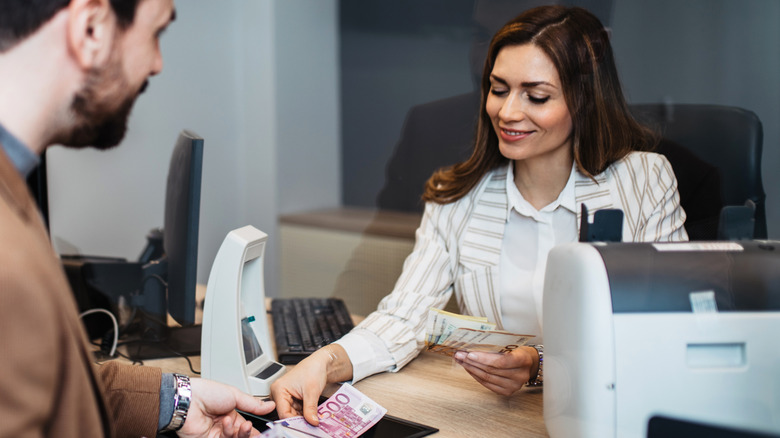The Best Ways To Save Yourself Money On Fees And Taxes While Visiting France
Whether your dream trip to France includes an evening trip to the top of the Eiffel Tower for the romantic views or an eerie descent down into the Paris catacombs, you probably have a budget that you need to stick to — and if you're not careful, unexpected taxes and fees can make a serious dent in your vacation fund. To find out how to make the most of your money while visiting France, we reached out to Victoria Fricke, the owner of luxury travel agency Vic's Vacations for advice. Fricke let us know that by using a travel credit card and making sure that you get a good exchange rate on euros before heading to France, you can avoid some hefty fees and taxes.
While there are several ways you can get caught up in unexpected fees while traveling internationally, there is at least one area that is cheaper while you're visiting France: luxury shopping. Fricke told us: "The VAT tax allows you to avoid paying hefty taxes on your goods, and the pricing of the products [is] typically cheaper than the U.S. So, if you've been eying a new bag this is the time to buy it."
Apply for a travel credit card
"Prior to going to Europe, we suggest to all clients to get a travel credit card," Victoria Fricke told us. While getting a new credit card might seem like a bad way to save money, getting the right travel card can actually save you a lot while traveling abroad. We're not talking about recklessly putting your entire trip on a card, of course. Instead, the right card (Fricke suggests Chase Sapphire) can serve as your primary form of payment while you're in France. That way, you can avoid the foreign transaction fees you usually get hit with when you use your debit card in another country.
"As enticing as it is to get an airline card, unless you fly often to use the perks, it creates a forced loyalty that often isn't in your best interest long term," Fricke warned. Instead, she recommends picking a travel card that can also get you perks, like travel insurance and extra points for booking flights and hotels. A good travel card can be your primary payment method for your whole trip, but Fricke also suggests bringing a few hundred euros broken up into small bills for buying from street vendors and tipping at your hotel.
Exchange your money before you leave for France
You can wait until you arrive in France to swap your dollars for euros, but according to Victoria Fricke, that could end up costing you a lot more than necessary. Fricke warned, "Exchanging money is a profitable business, which means they build in an overhead unless you do it direct with the bank. On average, you can expect to pay about a 10-15% overage exchange when doing so this way."
The cheapest way to exchange your money is at your own bank back at home. All you need to do is contact your bank in advance, tell them exactly how much money you want to bring with you, and have them order the euros. While it might take a little more work than just taking cash out of an ATM at the airport in France, it can save you serious money. If you happen to take out more than you use, you can always sell the euros back to your bank when you return home for the current exchange rate. Fricke explained: "You'll withdraw the exact exchange rate from your checking to pay for the Euros. So, if the exchange is 1.10 ($1.10 U.S. for every 1€) and you want 500€, you'll pay $550 for those. If you were to do it once abroad, even though the actual exchange is $1.10, they would probably charge you $1.20 or $1.25, making those same 500€ cost closer to $600."


